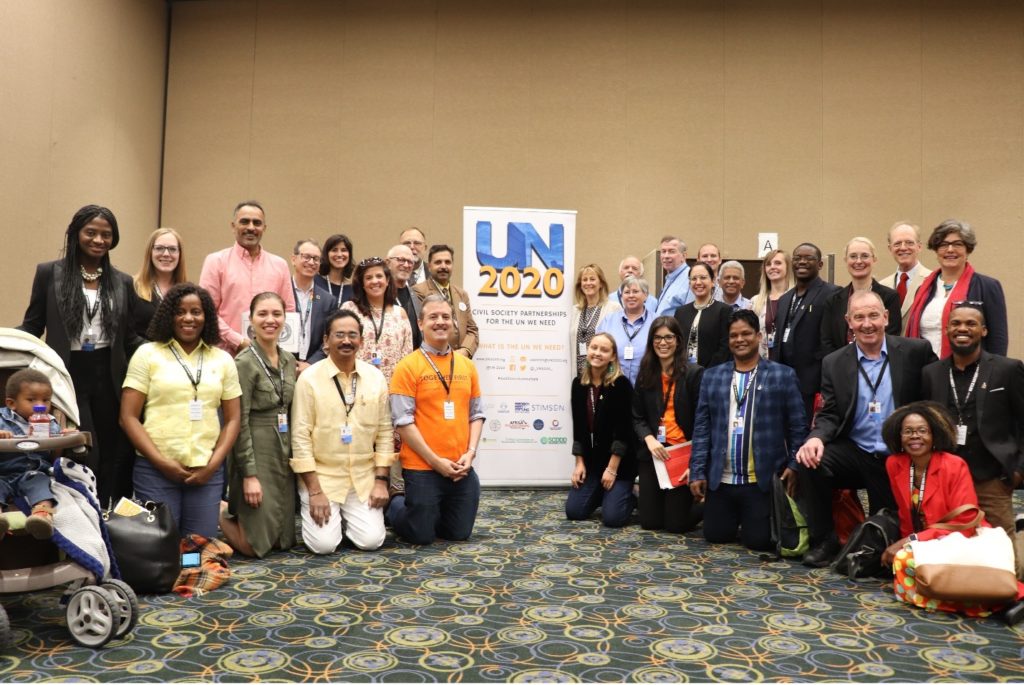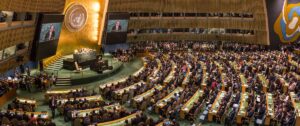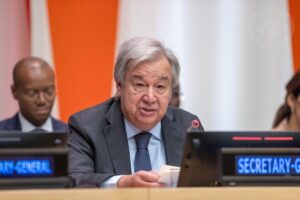Recommendation
Expand and ensure more coherent, inclusive, and collaborative participation of civil society and socially responsible businesses in shaping decision-making and supporting programming across the United Nations system through the establishment of a UN Global Partnership.
Global Challenge Update
Global civil society continues to make its mark in building more just, inclusive, and accountable forms of global governance. In recent years, civil society organizations (CSOs) worldwide have enhanced international negotiations and facilitated the adoption of key international instruments such as the Escazú Agreement, a binding treaty that aims to protect environmental rights defenders and provide space for citizen participation in environmental decision-making in Latin America and the Caribbean. The contributions of global civil society were further recognized when the Nobel Peace Prize was awarded, in 2017, to the International Campaign to Abolish Nuclear Weapons for its work on a treaty-based prohibition of nuclear weapons and, in 2018, to human rights advocates Denis Mukwege and Nadia Murad for their work safeguarding human rights.
Despite their many innovative contributions to global governance, civil society groups face repeated challenges to secure space at the global decision-making table. In November 2019, CIVICUS, for example—a 9,000-members global alliance dedicated to strengthening and expanding civil society action in the world—warned that civil society space was “under attack in 111 countries,” and that more than six billion people live in countries where civic space was “closed, repressed or obstructed.” CIVICUS also observed that sixteen of nineteen UN Member States on the UN Economic and Social Council’s Non-Governmental Organization Committee, which grants civil society consultative status, imposed “serious civic space restrictions” within their borders.1CIVICUS Global Alliance. “State of Civil Society Report 2020.” May 2020, 265. Accessed June 11, 2020. https://www.civicus.org/index.php/state-of-civil-society-report-2020.
Even non-governmental organizations that receive UN consultative status face difficulty participating in policy-making. Resourceful and large CSOs from the Global North have greater and disproportionate access to policy-making in global institutions compared to their counterparts from the Global South. In addition, while multistakeholder partnerships have widely complemented the work of multilateral institutions, civil society collaboration with the private sector (including through the UN Global Compact) on shaping and implementing global policy agendas has yet to reach its full potential.
Innovation Proposal:
Ensuring greater and more collaborative participation of civil society and socially responsible businesses in global policy-making could be achieved through a UN Global Partnership, as proposed by the Albright-Gambari Commission. With the backing of leadership from civil society organizations, the private sector, the United Nations, and the World Bank, the proposed Global Partnership would, first and foremost, seek to expand the quantity and quality of progressive non-state actor engagement in shaping global policy-making and better coordinating responses to transnational challenges. It could also oversee UN accreditation for CSOs and the business community and further enhance the principles of collaboration between civil society, the private sector, and the UN while advancing corporate social responsibility in global governance.2Commission on Global Security, Justice & Governance (Albright-Gambari Commission). Confronting the Crisis of Global Governance. The Hague and Washington D.C.: The Hague Institute for Global Justice and Stimson Center. 2015, 100.
To accommodate broader representation, including from the Global South, the UN Global Partnership would function primarily as an online hub. Much more is needed to reduce inequity and expand inclusion, such as working with those addressing the North-South digital divide. The partnership could also aim to facilitate swift and open collaboration to develop updated mechanisms for global digital cooperation precisely by using the capabilities, expertise, and resources of its members worldwide, including the private sector.
This recommendation aims to complement similar recent proposals to encourage enhanced civil society space at the UN. For example, the UN75 People’s Declaration and Plan for Global Action recommends the appointment of a “civil society focal point at the UN Under-Secretary level, a system wide review of stakeholder participation in UN processes, increased use of communications technology … for greater transparency, inclusivity, accountability, and participation and the creation of a global petition mechanism.”3UN2020 and Together First. “UN75 People’s Declaration and Global Plan for Action.” May 7, 2020. Accessed June 6, 2020. https://secureservercdn.net/198.71.233.184/b06.41d.myft-pupload.com/wp-content/uploads/2020/05/Final-Peoples-Declaration-and-Plan-of-Global-Action-1.pdf?time=1589376036. Combined with the UN Global Partnership idea, the proposed Under-Secretary-General for Civil Society would bolster more effective civil society participation at different levels across the UN system, serving as a voice for ideas and problem-solving alongside member states.
Strategy for Reform on the Road to 2020 (UN75):
The UN’s 75th anniversary has been in the spotlight, in part due to the strong and continuous advocacy efforts by the civil society-led coalitions UN2020 and Together First, who have sought to use the anniversary to amplify their call for global governance innovation and strengthening. Naturally, both campaigns have lobbied forcefully during the UN75 Declaration negotiations to widen civic space in future United Nations policy-making. In addition to garnering support from civil society, a sustained reform process for enhancing civic space at the United Nations would benefit from continued leadership from the UN Secretary-General. In his 2020 human rights report on the occasion of the world body’s 75th anniversary, Secretary-General Guterres recommended utilizing UN75 as an opportunity to “launch a dialogue on more systematic participation of civil society in UN bodies and agencies … and to design a system-wide strategy on civic space and adequate guidance to UN leaders in the field.”4United Nations. Secretary-General. The Highest Aspiration. A call to Action for Human Rights. Report of the Secretary-General, 9. February 2020. Accessed June 6, 2020. https://www.un.org/sg/sites/www.un.org.sg/files/atoms/files/The_Highest_Asperation_A_Call_To_Action_For_Human_Right_English.pdf. In addition, the draft UN75 Declaration calls for the Secretary-General to “report back before the end of the seventy-fifth session of the General Assembly with recommendations to advance our common agenda and to respond to current and future challenges.”5United Nations. “Declaration of the Commemoration of the Seventy-Fifth Anniversary of the United Nations.” Draft, July 3, 2020, 4. Accessed July 3, 2020. https://www.un.org/pga/74/wp-content/uploads/sites/99/2020/07/UN75-FINAL-DRAFT-DECLARATION.pdf.
Seizing this opportunity, UN2020 and Together First, alongside global civil society more generally, should seek to refine major elements of the abovementioned UN Global Partnership concept at the UN75 Global Governance Forum planned for September 16-17, 2020. Planning discussions in the weeks preceding the forum and the UN75 Summit on September 21st could actively engage substantive inputs and support from influential CSOs, the UN Departments of Global Communications and Economic and Social Affairs, the World Bank, and representatives of supportive private sector networks. These initial strategy discussions could subsequently lead to dialogues with the Secretary-General and Member States to formally stand-up a UN Global Partnership and its associated new Under-Secretary-General for Civil Society to champion under-represented voices and sorely needed new perspectives and expertise in UN system policy-making.
Notes
- 1CIVICUS Global Alliance. “State of Civil Society Report 2020.” May 2020, 265. Accessed June 11, 2020. https://www.civicus.org/index.php/state-of-civil-society-report-2020.
- 2Commission on Global Security, Justice & Governance (Albright-Gambari Commission). Confronting the Crisis of Global Governance. The Hague and Washington D.C.: The Hague Institute for Global Justice and Stimson Center. 2015, 100.
- 3UN2020 and Together First. “UN75 People’s Declaration and Global Plan for Action.” May 7, 2020. Accessed June 6, 2020. https://secureservercdn.net/198.71.233.184/b06.41d.myft-pupload.com/wp-content/uploads/2020/05/Final-Peoples-Declaration-and-Plan-of-Global-Action-1.pdf?time=1589376036.
- 4United Nations. Secretary-General. The Highest Aspiration. A call to Action for Human Rights. Report of the Secretary-General, 9. February 2020. Accessed June 6, 2020. https://www.un.org/sg/sites/www.un.org.sg/files/atoms/files/The_Highest_Asperation_A_Call_To_Action_For_Human_Right_English.pdf.
- 5United Nations. “Declaration of the Commemoration of the Seventy-Fifth Anniversary of the United Nations.” Draft, July 3, 2020, 4. Accessed July 3, 2020. https://www.un.org/pga/74/wp-content/uploads/sites/99/2020/07/UN75-FINAL-DRAFT-DECLARATION.pdf.




